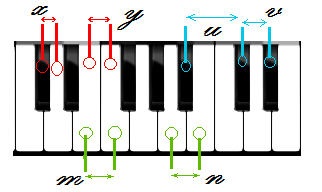The pattern of key arrangement in harmonium/keyboard/piano is like this:
 , where I can see 2-types of condition between 2 successive keys.
, where I can see 2-types of condition between 2 successive keys.
1: black to white (or white to black) (say their difference isfreq. x Hertz(Hz) is X-times different)
2: white to white (say they differ in y Hertztheir frequency is y-times different)
(3: There is no 2 black side by side)
Now is x = y ? i.e the frequency-differencemultiplier between any-2 successive keys are same?
I can't conclude this by judging it through ear; because just like each x sounds the same to each y; from this pattern, if I play only the white-keys; still I sense there difference as the same (i. e m=n); and if I play only the black-keys, I sense (hear) their difference as same, too (i.e. u=v).
(what a bizarre illusion!!! hats of to who designed the scale)
Now any 1 of them is correct. which one?
P.S. As well I'm not a musical person and never learnt music. so please elaborate/hyperlink about terminologies.
